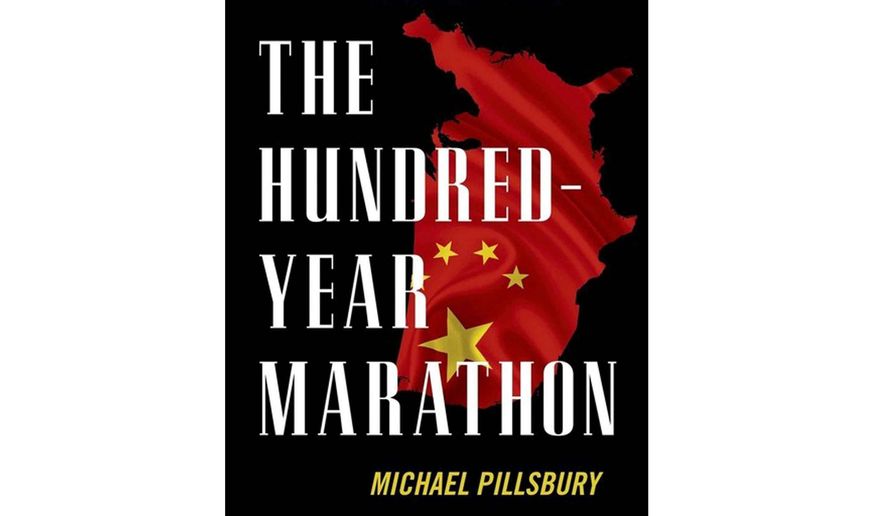OPINION:
THE HUNDRED-YEAR MARATHON: CHINA’S SECRET STRATEGY TO REPLACE AMERICA AS THE GLOBAL SUPERPOWER
By Michael Pillsbury
Henry Holt and Company, $30, 336 pages
Reading “The Hundred-Year Marathon” was a bittersweet experience. Sweet because this one-time “panda hugger” (as Michael Pillsbury describes himself) has now joined ranks with those of us who have long seen China as bent upon global domination. Bitter because China’s secret strategy to replace America as the sole superpower is well on the way to success.
Mr. Pillsbury’s is not a half-hearted conversion. He asserts that our entire China policy has been — and continues to be — based on a series of strategic deceptions, brilliantly conceived and executed by the Chinese party-state. These deceptions are designed to make America the engine of her own destruction, and China the chief beneficiary of her demise. Our misreading of this — China’s grand strategy — is the greatest U.S. intelligence failure of the past 50 years.
Such sweeping assertions would strain credulity were they not coming from a national security expert who has played a key role in China policy over a career spanning eight presidential administrations. As it is, Mr. Pillsbury is able to provide the kind of granular detail — from the testimony of Chinese defectors to internal debates over the direction of China policy — that leaves the reader utterly convinced that he knows whereof he speaks.
These deceptions date back to the very beginning of the U.S.-China relationship, as Mr. Pillsbury shows. It turned out to be all too easy to manipulate the reigning hegemon.
The largest transfer of scientific knowledge from one country to another in human history was soon underway, as first Richard Nixon and Jimmy Carter, and then Ronald Reagan and George H.W. Bush, authorized ever closer economic and military cooperation — unwittingly helping China in its long march to overtake us.
The Tiananmen Massacre and subsequent crackdown should have should have ended American illusions about China once and for all. Instead, as Mr. Pillsbury reveals, Beijing adopted a two-pronged strategy. At home the Chinese Communist Party rewrote history to stoke radical nationalism and indoctrinate their people in anti-Americanism, while abroad they successfully engaged in the pretense of being a responsible partner in maintaining the current, U.S.-led world order.
When I first wrote about China’s hypernationalistic “Patriotic Education” program in 2000 — roughly a decade after it was put in place — senior people at the CIA downplayed its significance. In reality, as Mr. Pillsbury now makes clear, the Chinese leadership have concocted a false history of Sino-American relations that is force-fed to young Chinese not just to “immunize” them against democracy, but for a larger strategic purpose. The men of the Politburo are determined to avenge China’s “Century of Humiliation” at the hands of the West and restore China’s pre-eminence, and they want to make sure that the Chinese people follow in lockstep.
Beijing wants the world to believe that moderate reformers are in charge but, as Mr. Pillsbury documents, China’s hawks now dominate the upper reaches of the party, military and government. These nationalist hard-liners see war between the United States and China as inevitable and — in a real sense — already underway in cyberspace.
The chief hard-liner is Chinese President Xi Jinping himself, who in speeches has made clear his determination to surpass America. Mr. Xi’s call for the realization of a “strong nation dream,” Mr. Pillsbury points out, is a direct reference to the military hawks’ vision of China as the world’s leading power by midcentury.
If this is allowed to happen, he warns in conclusion, the world will be a different and darker place. Fragile democracies in Asia, Africa and Latin America will falter as America’s influence and example wanes. Dictatorships will arise in their place, aided and abetted by the Chinese hegemon. A world dominated by China will be a world in which tyranny reigns and freedom is eclipsed — perhaps for a very, very long time.
If I have a disagreement with Mr. Pillsbury, it is over the shape of China’s near-term military ambitions. It is true that China does not want to challenge the reigning hegemon too soon and so it is not — currently — building a military force capable of projecting power globally. China’s hawks do not want to enter prematurely into the kind of arms race that drove the Soviet Union to dissolution.
At the same time, China is feeling confident enough in its own growing might that it has already abandoned its “stealth mode,” at least in part. It has changed its strategic doctrine to seek control out to the first island chain — Japan, Taiwan, the Philippines — and has crafted a suite of weapons — called “Assassin’s maces” — that can be used to threaten American forces there. China has made no secret of this military build-up.
Following the Communist victory in the Chinese civil war, Americans agonized over “Who lost China?” If we do not recognize the Chinese party-state for the predatory animal that it is, in 20 years the question we will be asking ourselves is “Who lost the world?”
The answer will be, “We did.”
• Steven W. Mosher is the president of the Population Research Institute and the author of “Hegemon: China’s Plan to Dominate Asia and the World” (Encounter Books).




Please read our comment policy before commenting.